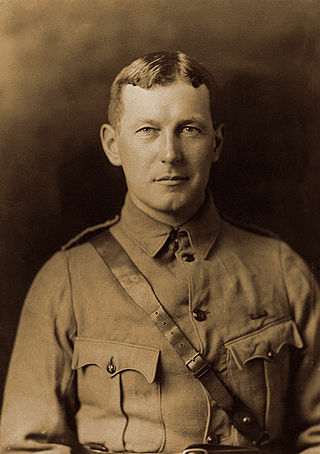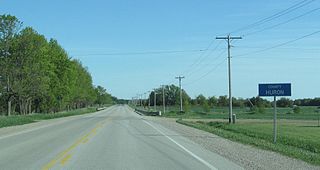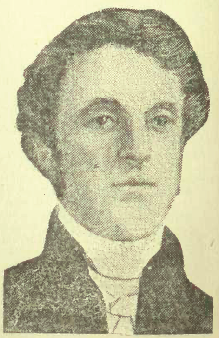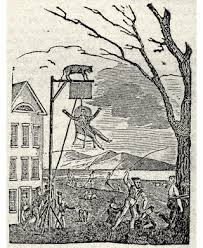Related Research Articles

The Province of Canada was a British colony in British North America from 1841 to 1867. Its formation reflected recommendations made by John Lambton, 1st Earl of Durham, in the Report on the Affairs of British North America following the Rebellions of 1837–1838.

The Province of Upper Canada was a part of British Canada established in 1791 by the Kingdom of Great Britain, to govern the central third of the lands in British North America, formerly part of the Province of Quebec since 1763. Upper Canada included all of modern-day Southern Ontario and all those areas of Northern Ontario in the Pays d'en Haut which had formed part of New France, essentially the watersheds of the Ottawa River or Lakes Huron and Superior, excluding any lands within the watershed of Hudson Bay. The "upper" prefix in the name reflects its geographic position along the Great Lakes, mostly above the headwaters of the Saint Lawrence River, contrasted with Lower Canada to the northeast.

"In Flanders Fields" is a war poem in the form of a rondeau, written during the First World War by Canadian physician Lieutenant-Colonel John McCrae. He was inspired to write it on May 3, 1915, after presiding over the funeral of friend and fellow soldier Lieutenant Alexis Helmer, who died in the Second Battle of Ypres. According to legend, fellow soldiers retrieved the poem after McCrae, initially dissatisfied with his work, discarded it. "In Flanders Fields" was first published on December 8 of that year in the London magazine Punch. Flanders Fields is a common English name of the World War I battlefields in Belgium and France.

Lieutenant-Colonel John McCrae was a Canadian poet, physician, author, artist and soldier during the World War I and a surgeon during the Second Battle of Ypres, in Belgium. He is best known for writing the famous war memorial poem "In Flanders Fields". McCrae died of pneumonia near the end of the war. His famous poem is a threnody, a genre of lament.

Huron County is a county of the province of Ontario, Canada. It is located on the southeast shore of its namesake, Lake Huron, in the southwest part of the province. The county seat is Goderich, also the county's largest community.

McCrae is a suburb on the Mornington Peninsula in Melbourne, Victoria, Australia, 59 km (37 mi) south of Melbourne's Central Business District, located within the Shire of Mornington Peninsula local government area. McCrae recorded a population of 3,311 at the 2021 census.

Henry Sherwood, was a lawyer and Tory politician in the Province of Canada. He was involved in provincial and municipal politics. Born into a Loyalist family in Brockville in Augusta Township, Upper Canada, he studied law and was called to the bar of Upper Canada in 1828. In 1838, he was appointed Queen's Counsel. Sherwood was part of the Family Compact, the inter-connected families of strong British and Loyalist sympathies which dominated the government of Upper Canada in the early years of the 19th century

George Warren McCrae Jr. is an American soul and disco singer who is most famous for his 1974 hit "Rock Your Baby".
Benjamin Pawling was a soldier, judge, political figure and publisher in Upper Canada.

Alma is an unincorporated rural community in Mapleton Township, Wellington County, Ontario, Canada.
Alexander McDonell, Esq. was an immigration agent, military officer and member of the Legislative Assembly of Upper Canada. After immigrating from Scotland to Upper Canada he fought in the War of 1812 with the Canadian fencibles. He later served as a Colonel and assembled a militia to help quell the Upper Canada Rebellion, although they were never called to action. He spent most of his professional life as a Crown agent in the area surrounding Peterborough, Ontario assigning plots of land to settlers, advocating for projects to improve the infrastructure, and settling disputes as a Justice of the Peace. He was elected to the Legislative Assembly of Upper Canada in 1834 and reelected in 1836 by relying on his reputation after helping settlers and running on a pro-British platform. He lost his election to the Legislative Assembly of the Province of Canada in 1841 and became a lumberjack after his retirement in 1843.

Gideon Adams was a farmer, soldier, and politician in Upper Canada, British North America, British Empire, now Ontario, Canada.
Gilbert McMicking was a businessman and political figure in Upper Canada. He was the son of Agness Roberson (1745–1827) and Peter McMicking (1731–1823), a United Empire Loyalist who immigrated to Upper Canada during the American Revolutionary War and settled in Stamford in 1780.
Thomas McCrae was a farmer, innkeeper and political figure in Upper Canada.
Edmund Fuller Murney was a lawyer and political figure in Upper Canada. He represented Hastings in the Legislative Assembly of Upper Canada from 1836 to 1841 and in the Legislative Assembly of the Province of Canada from 1842 to 1848 and from 1852 to 1856 as a Conservative member.
Samuel Street Wilmot was a surveyor, tanner, farmer and political figure in Upper Canada. He represented Durham in the Legislative Assembly of Upper Canada from 1820 to 1824.
Upper Partridge Lake is a fresh water lake in the Lake Ontario drainage basin in the Cashel portion of the township of Tudor and Cashel, Hastings County, Ontario, Canada. It is about 3.7 kilometres (2.3 mi) southwest of the community of McCrae and just south of Weslemkoon Lake Road that leads to that community.
Partridge Creek is a creek in the Moira River and Lake Ontario drainage basins in Hastings and Lennox and Addington Counties, Ontario, Canada.
See also McRae (disambiguation) and MacRae (disambiguation)
Huron was an electoral district of the Legislative Assembly of the Parliament of the Province of Canada, in Canada West. It was created in 1841, upon the establishment of the Province of Canada by the union of Upper Canada and Lower Canada, and was based on Huron County. Huron was represented by one member in the Legislative Assembly. It was abolished in 1867, upon the creation of Canada and the province of Ontario.
References
- Becoming Prominent: Leadership in Upper Canada, 1791-1841, J.K. Johnson (1989)